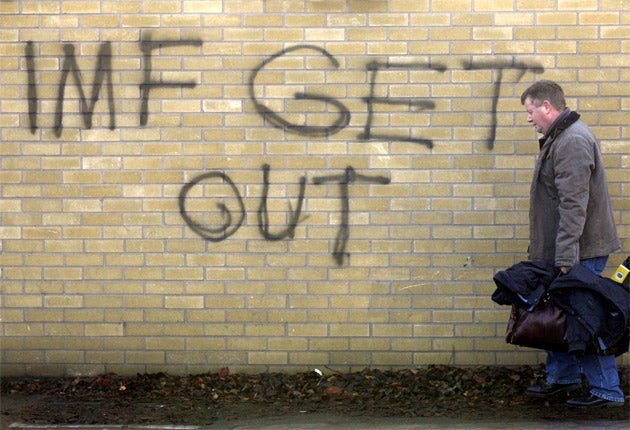Fears for euro remain as Ireland's woes continue

Your support helps us to tell the story
From reproductive rights to climate change to Big Tech, The Independent is on the ground when the story is developing. Whether it's investigating the financials of Elon Musk's pro-Trump PAC or producing our latest documentary, 'The A Word', which shines a light on the American women fighting for reproductive rights, we know how important it is to parse out the facts from the messaging.
At such a critical moment in US history, we need reporters on the ground. Your donation allows us to keep sending journalists to speak to both sides of the story.
The Independent is trusted by Americans across the entire political spectrum. And unlike many other quality news outlets, we choose not to lock Americans out of our reporting and analysis with paywalls. We believe quality journalism should be available to everyone, paid for by those who can afford it.
Your support makes all the difference.There is little sign of an end to the pain either in Ireland or the wider eurozone. The IMF, which is part-funding the rescue package, has suggested that Ireland should gradually lower unemployment benefits and cut its minimum wage, one of the highest in the EU, to boost employment and help the economy grow its way out of its troubles. The IMF proposals were approved by Ajai Chopra, the IMF's mission chief in Dublin.
Meanwhile an EU spokesman suggested it was hard to imagine Ireland remaining a low-tax country, an apparent reference to Dublin's ultra-low 12.5 per cent corporation tax rate, an irritant to EU partners, such as the UK, France and Germany.
In addition, the French Economic Affairs Minister, Christine Lagarde, has said Ireland would have to raise taxes as part of its deficit-cutting package.
Moody's, a credit ratings agency, added that it is likely to cut Ireland's sovereign debt rating by several notches as the bailout will transfer the burdens of the banking system to the state.
Despite a near-blanket guarantee to the owners of bonds issued by Irish banks, the restructuring of the most insolvent of them all, Anglo-Irish Bank, may see some investors receive just 1 cent per €1,000 bond.
Yet even as the final details of the deal are worked out, the markets had intensified the pressure on the nation now dubbed "too big to save": Spain. The additional "risk premium" investors demand to hold Spanish government bonds over their relatively safe German equivalents rose yesterday to almost 2.5 per cent, a record for Spain's time as a member of the euro area.
While generally not as high as Greek, Irish or Portuguese interest rates, it suggests that the markets are "pricing in" an ever increasing risk of default or an attempted bailout by the European Financial Stability Fund.
The problem, however, is that the size of the Spanish economy, her banking system and combined national liabilities could overwhelm the fund.
Many economists believe that a toxic cocktail of banking losses, government deficits and uncompetitive economies around the euro area's "periphery" will put the currency under intolerable strain.
Join our commenting forum
Join thought-provoking conversations, follow other Independent readers and see their replies
Comments